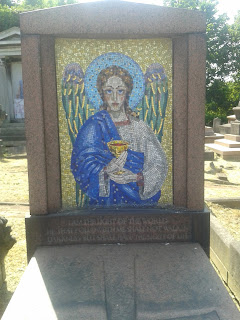O friend unseen, unborn, unknown,
Student of our sweet English tongue,
Read out my words at night, alone:
I was a poet, I was young.
Since I can never see your face,
And never shake you by the hand,
I send my soul through time and space
To greet you. You will understand.
Student of our sweet English tongue,
Read out my words at night, alone:
I was a poet, I was young.
Since I can never see your face,
And never shake you by the hand,
I send my soul through time and space
To greet you. You will understand.
But what of
today’s far faster-scrolling cultural landscape, where we barely find time to
read a poem before the next newly discovered, media-hyped prize-winner demands
our skittish attention and where – with libraries and bookshops rapidly
disappearing - half the poetry we encounter doesn’t even exist as print upon a
page but is floating in a cloud somewhere on the vast hypothetical repository
of the internet? Our sense of history and time has blurred, hardly helped by
ominous global events that seem to undermine any concept of a secure futurity. Within
such a flickering maelstrom of fake news and the otiose verbiage of social
media, what body of poetry can stake its claim to survival into the next
generation, let alone what used to be known as “immortality”?
Such anxieties seem to haunt the margins of
Chris McCabe’s ongoing project to investigate the obscure poets buried in
London’s Victorian cemeteries, hoping to uncover a “mute, inglorious Milton”
who has somehow (in Pound’s phrase) “’scaped immortality”. The opening
instalment, In the Catacombs: A Summer
Among the Dead Poets of West Norwood Cemetery (Penned in the Margins, 2014), initiated an alluring prose-hybrid form
that collaged documentary, literary criticism and autobiography in a
multifaceted narrative which owed something to later works by Iain Sinclair (eg.
London Orbital and Edge of the Orison), tracing
intersections in time and location that eventually forge a deep-rooted, almost
occult coherence.
What gave this launch
of the project a further edge and scope was McCabe’s collaboration with visual artists
who were creating a “site-specific art-trail” within West Norwood Cemetery
during 2013, so that the book and its dead poets could be experienced in a
concrete, physical dimension. Interested readers could visit the cemetery (as I
did that summer) and follow the trail with McCabe: he also deposited small oval
stones printed with words from each of the poet’s writings at the sites of
their burial (some now overgrown or displaced) and there was also a limited
edition anthology of the poets placed in the columbarium. The leaving of
poem-stones seemed a gesture in keeping with the overall project of seeking a
perpetuity for poets’ words: one wonders how many of the stones are still there
in West Norwood Cemetery today?
Cenotaph South is a more
personally-invested book, interspersed throughout by McCabe’s diaristic notations
of his mother’s cancer-scare and memories of his dead father, lending the sense
of a poignant self-pilgrimage to McCabe’s investigations, albeit often
counterbalanced by the redeeming innocence of playful interactions with his son
Pavel. There is also a more writerly level whereby McCabe strives to validate
his place within the historical continuity of poets by constantly scanning his surroundings for links with his
antecedents, eventually elaborating a “coffin-shaped” path on the map of
Nunhead, Dulwich and Peckham Rye which demarcates the area of his dogged
psychogeographic research.
The network of
associations he traces is remarkably rich and diverse: he initiates his
enquiries by trying to locate the tree on Peckham Rye in which Blake had a
vision of angels as a boy, then visits Dulwich College, where Barry McSweeney
did his last poetry reading in 2000, before visiting the house where Robert
Browning lived on Telegraph Hill and the site of a pub in Dulwich Village where
BS Johnson used to attend poetry events in the 1960s. He also comes across the
grave of Henry Mew, brother of the poet Charlotte, who wrote a vivid monologue
addressed to her brother called ‘In
Nunhead Cemetery’.
By invoking such
outsider-poets as Blake, Mew and McSweeney (significantly it’s the proto-Modernist
Browning of the experimental Sordello he’s
drawn to rather than the later renowned man of letters) McCabe seems to be attempting
to delineate his own alternative poetic history, an idiosyncratic “historical
grammar of poetic myth” perhaps modelled on one of the many books he cites,
Robert Graves’ The White Goddess. This
is underlined in the chapter ‘At Home with the BBC: Reconsidering the Canon’,
where his reflections on a BBC documentary suggest how the poetry establishment
typified by TS Eliot and Faber worked with the BBC to endorse a particular
narrow canon of mostly white male mainstream poets.
As for Nunhead
Cemetery itself, the buried poets McCabe identifies (with the help of historian
Tim Stevenson) are a motley selection: mostly Victorians, like the once widely-anthologised
‘Laureate of the Babies’ William Cox Bennet, their often staid, sentimental
verses hardly stand the test of time, although McCabe is a generous and
knowledgeable enough reader to find at least something positive in all of the
poets, especially George Thornbury whose documentary prose about London seems a
precursor of McCabe’s own.
Despite its
potentially dark subject-matter, Cenotaph
South culminates on a positive note, with news that McCabe’s mother is in
recovery from her chemotherapy and that a new poetry-scene seems to be
flourishing in the gentrified environs of Peckham and Nunhead, reminding us
that “this is how the dead poets still speak – through the living”. An
undiscovered poet of genius is yet to be unearthed from the tangled undergrowth
of Nunhead Cemetery and therefore McCabe’s quest must continue to another of
London’s Victorian cemeteries, leading the way for the next instalment of what
is becoming a compelling and highly original sequence.


















